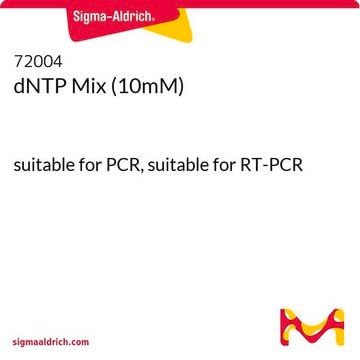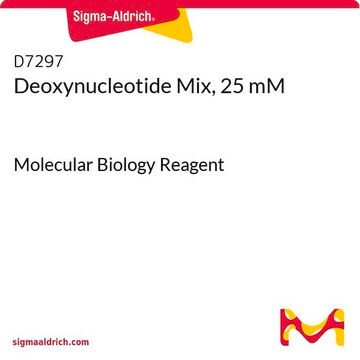DNTPCA1
CleanAmp™ dNTP
Hot-start dNTP mix for improved PCR
Sinónimos:
Deoxynucleotides, dNTP, dNTP Mix
About This Item
Productos recomendados
formulario
liquid
Características
hotstart
concentración
10 mM (each dNTP)
color
colorless
Condiciones de envío
dry ice
temp. de almacenamiento
−20°C
¿Está buscando productos similares? Visita Guía de comparación de productos
Descripción general
Aplicación
- For PCR amplifications that require reduced non-specific amplification
- For multiplex PCR
- For reduction of primer dimers
- Substitute for dNTPs in any PCR reaction
Envase
10 μmoles: 1 vial, 1000 μL, each dNTP at 10 mM in 50 mM Glycine
Información legal
Código de clase de almacenamiento
12 - Non Combustible Liquids
Clase de riesgo para el agua (WGK)
WGK 2
Punto de inflamabilidad (°F)
Not applicable
Punto de inflamabilidad (°C)
Not applicable
Certificados de análisis (COA)
Busque Certificados de análisis (COA) introduciendo el número de lote del producto. Los números de lote se encuentran en la etiqueta del producto después de las palabras «Lot» o «Batch»
¿Ya tiene este producto?
Encuentre la documentación para los productos que ha comprado recientemente en la Biblioteca de documentos.
Los clientes también vieron
Artículos
Identify causes and remedies for SDS-PAGE sample preparation challenges and optimize electrophoresis conditions.
Nuestro equipo de científicos tiene experiencia en todas las áreas de investigación: Ciencias de la vida, Ciencia de los materiales, Síntesis química, Cromatografía, Analítica y muchas otras.
Póngase en contacto con el Servicio técnico











